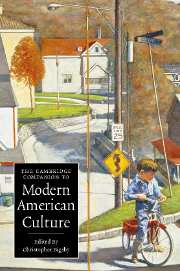Book contents
- Frontmatter
- 1 Introduction: What, then, is the American?
- 2 The American century
- 3 The regions and regionalism
- 4 Immigration to the United States in the twentieth century
- 5 Religion in the United States in the twentieth century: 1900-1960
- 6 Shifting boundaries: religion and the United States: 1960 to the present
- 7 The Hispanic background of the United States
- 8 African Americans since 1900
- 9 Asian Americans
- 10 Women in the twentieth century
- 11 Queer America
- 12 The United States, war, and the twentieth century
- 13 The culture of the Cold War
- 14 Secret America: the CIA and American culture
- 15 Vietnam and the 1960s
- 16 New York City and the struggle of the modern
- 17 Music: sound: technology
- 18 African American music of the twentieth century
- 19 Hollywood cinema
- 20 Popular culture
- 21 Theatre
- 22 Society and the novel in twentieth-century America
- 23 “Preferring the wrong way”: mapping the ethical diversity of US twentieth-century poetry
- Index
- Series List
5 - Religion in the United States in the twentieth century: 1900-1960
Published online by Cambridge University Press: 28 January 2007
- Frontmatter
- 1 Introduction: What, then, is the American?
- 2 The American century
- 3 The regions and regionalism
- 4 Immigration to the United States in the twentieth century
- 5 Religion in the United States in the twentieth century: 1900-1960
- 6 Shifting boundaries: religion and the United States: 1960 to the present
- 7 The Hispanic background of the United States
- 8 African Americans since 1900
- 9 Asian Americans
- 10 Women in the twentieth century
- 11 Queer America
- 12 The United States, war, and the twentieth century
- 13 The culture of the Cold War
- 14 Secret America: the CIA and American culture
- 15 Vietnam and the 1960s
- 16 New York City and the struggle of the modern
- 17 Music: sound: technology
- 18 African American music of the twentieth century
- 19 Hollywood cinema
- 20 Popular culture
- 21 Theatre
- 22 Society and the novel in twentieth-century America
- 23 “Preferring the wrong way”: mapping the ethical diversity of US twentieth-century poetry
- Index
- Series List
Summary
Two events which took place near the turn of the twentieth century are instructive places to begin to understand the dynamics of American religion: the World's Parliament of Religions in Chicago and the passage of the Eighteenth Amendment to the US Constitution. The former, which was held in conjunction with the World's Columbian Exposition in 1893, was the first time in US history that a conscious attempt was made to promote interreligious dialogue on a significant scale. Representatives of every conceivable tradition were invited by the organizers, who were themselves of the liberal wing of the itself liberal Unitarian movement, and a wide variety of spokespeople took advantage of the opportunity to explain to the American public exactly what their traditions taught. The event was not without controversy: Roman Catholic bishops, for example, were divided over the wisdom of participating, although the forward-looking Archbishop John Ireland of Minnesota decided that the risks of seeming to relativize his church were worth the opportunity of gaining a sympathetic hearing. In addition to the more general acknowledgment of religious pluralism in the nation, the Parliament resulted in the American public's having an opportunity to witness the diversity that already characterized the national religious scene as well as a chance to learn about heretofore exotic traditions such as Hinduism, which for the first time now began to reach an audience beyond the minute number of ethnic South Asians then resident in the country.
- Type
- Chapter
- Information
- The Cambridge Companion to Modern American Culture , pp. 96 - 112Publisher: Cambridge University PressPrint publication year: 2006



